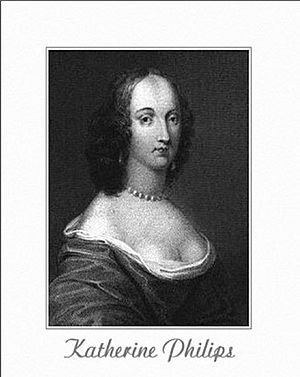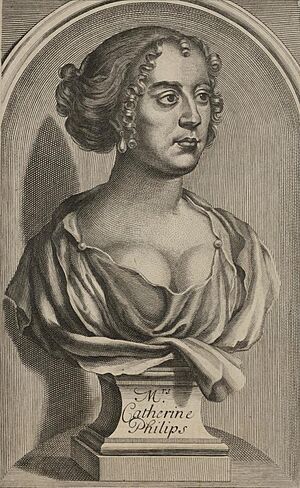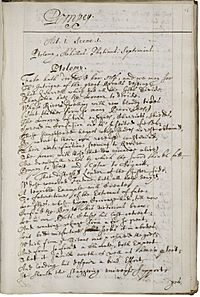Katherine Philipps facts for kids
Katherine Philips (born January 1, 1631/2 – died June 22, 1664) was a famous Anglo-Welsh poet and translator. She was also known as "The Matchless Orinda." Katherine was a royalist, meaning she supported the king during a time of political unrest. She became well-known for translating plays by the French writer Pierre Corneille, especially Pompée and Horace. Many important writers, like John Dryden and John Keats, admired her work and said she was very influential.
Early Life and Education
Katherine was born in London. Her father, John Fowler, was a cloth merchant. Her mother, also named Katherine, came from a family involved in medicine. Katherine was a very bright child. A cousin said she could read the Bible before she was four years old! She also learned to speak several languages very well.
After her father passed away, Katherine moved to Wales with her mother, who had remarried. From 1640 to 1645, she attended a boarding school in Hackney, near London. This school was known for educating girls. There, she started writing poems with her friends. She also enjoyed French stories and plays, which later inspired the special nicknames she gave to her friends.
Katherine grew up in a family that followed Presbyterian traditions, a type of Protestant religion. However, she later chose to join the Church of England. She also became a strong supporter of the king and his policies.
In 1647, when Katherine was sixteen, she married James Philipps. He was a Welsh politician. For a long time, people thought James was much older than Katherine. But their marriage certificate shows he was actually 24 years old, making them closer in age. Katherine and James had two children. Sadly, their son, Hector, died when he was a baby in 1655. Katherine wrote some sad poems about his death, like "Epitaph On Her Son H. P."
Life as a Writer
Katherine Philips was at the center of a group called the "Society of Friendship." This group was inspired by ideas about special, non-romantic love that came from France in the 1630s. Members of the Society used special nicknames, often from French stories or plays. For example, Katherine was called "Orinda," her husband was "Antenor," and a friend named Sir Charles Cotterel was "Poliarchus."
Through this Society, Katherine explored the ideas of friendship and loyalty. She helped set a high standard for writers of her time. "The Matchless Orinda," as her fans called her, was seen as a leader in promoting female friendship. She was admired as an ideal woman writer: good, proper, and pure. Her poems often celebrated the joys of deep, platonic friendships. Many famous writers, like Jeremy Taylor and Abraham Cowley, praised her talent.
In 1662, Katherine traveled to Dublin, Ireland. She went there to help her husband with a legal case about some land they might lose. While in Dublin, she finished translating a play by Pierre Corneille called Pompée. This play was performed with great success in 1663 at the Smock Alley Theatre. It was also printed in Dublin and London that same year.
Katherine's translation of Pompée was very important. It was the first time a French tragedy was translated into English poetry. It was also the first English play written by a woman to be performed on a professional stage.
In 1664, a collection of her poems was published without her permission. It was called Poems by the Incomparable Mrs. K.P. Sadly, it contained many mistakes. In March 1664, Katherine traveled to London with another translation of Corneille's play, Horace, almost finished. But she became sick and died from smallpox. She was buried in a church in London that was later destroyed in the Great Fire of London.
Premiere of Pompey
On February 10, 1663, Katherine Philips's play, Pompée, had its first performance at the Smock Alley Theatre in Dublin. The opening night was a big event. Important people, including the Lord Lieutenant of Ireland, were in the audience. People from all parts of society came to watch.
Ireland at this time had political tensions between Catholics and Protestants. The theatre offered a welcome break from these difficult relations, which followed the English Civil War. The play's opening speech was general enough that the audience could imagine it was about their own current political situation. Some people even rumored that Katherine Philips was in the audience, or perhaps even acted in the play herself!
Legacy and Influence
Katherine Philips's work had a lasting impact. She inspired a character named "Orinda" in an Italian play from 1671 called Il Cromuele (Cromwell). This shows how well-known and respected she was even after her death.
See also
 In Spanish: Katherine Philips para niños
In Spanish: Katherine Philips para niños
 | Bayard Rustin |
 | Jeannette Carter |
 | Jeremiah A. Brown |




